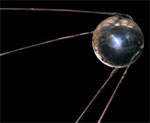 What has happened to our sense of adventure? 50 years ago today that Russian metal thing (left) went “Beep, beep, beep” and we were thrust into the Space Age. But now the Space Age is dead.
What has happened to our sense of adventure? 50 years ago today that Russian metal thing (left) went “Beep, beep, beep” and we were thrust into the Space Age. But now the Space Age is dead.
On 4 October 1957, it was a beach ball with a beeper inside. A month later, 3 November, it was a differently-shaped Russian metal thing with a dog inside.
“Jay-zus,” thought America, collectively. “Those goddam Commies have gotten into space! And they’ve got The Bomb.” They called it “the Sputnik Crisis” and the US created ARPA (which eventually developed the Internet) and New Math (which created a huge market in hula hoops for primary schools).
The first human in space was in 1961. And only eight years later people were walking on the moon.
But now, in 2007, it’s been 35 years since anyone’s been to the moon. Indeed, it’s been 35 years since anyone’s been more than 480km from Earth.
I could write an essay on the death of the Space Age — but amateur astronomer Stuart Atkinson has already done it. His impassioned plea for space makes the point that it’ll be the commercial mavericks who create our future in space, not the slow-moving international “cooperation” which created the lame ISS — and certainly not boring old farts like NASA.
What the hell were we thinking? No, seriously, what the hell were we thinking? We had a beach-head in space; we’d stepped off the Earth and started to become a multi-planet species, a species capable of surviving an asteroid impact, or a nuclear war, or population crises. We’d just started to Think Big, to dare to dream, to look beyond our own close horizon to the world beyond, and we turned away from it all. We ran back from the Moon with our tail between our legs, whimpering, cowering from the darkness, frightened by its immensity.
Watching shuddery footage of Neil Armstrong descending Eagle’s ladder, and of Dave Scott standing wide-eyed with wonder on the edge of Hadley Rille, the historians of the future, sitting around their holographic displays in the grand museums and universities of the worlds circling 51 Pegasi and other exotic star systems will shake their heads in disbelief and pity and contempt at what we did after Apollo. They’ll think us timid at best, cowards at worst, for how we fled from the future. They’ll debate endlessly the reasons why, instead of keeping going, instead of settling the Moon, reaching out for Mars and spreading across the solar system as is our destiny we came home, shut the door, turned off all the lights and went to bed, pulling the covers over our heads so we wouldn’t have to see the Moon and planets and stars shining seductively through the window.
God, if we’d just kept going… don’t you ever wonder what it would be like now? What kind of world we would be living in?
…
It makes me want to scream at the sky “I’m sorry! We were stupid! Forgive us!†and hope my words reach the citizens of the future.
It’s worth reading the whole thing.
I agree with Stuart’s point. Indeed, I’ve written before about the glory of Mars and why the US space program is shite. But where is that sense of adventure?

what about the X Prize that I wrote about on my blog a month ago? The space race sponsored by google? Anyway, we have enough to fix down here. Boring tho that may be.
@Laurel Papworth: Yes, the Google Lunar X Prize. I think this is exactly the sort of “maverick” thing that Stuart Atkinson’s rant refers to. Not that I’ve properly read about Google’s thingy yet.
(I wonder if Google still counts as “maverick” given that they’re one of the biggest, richest businesses in the world and have become a part of “mainstream culture” — you know, being a verb n’all? I know their marketing department would like us to think so.)